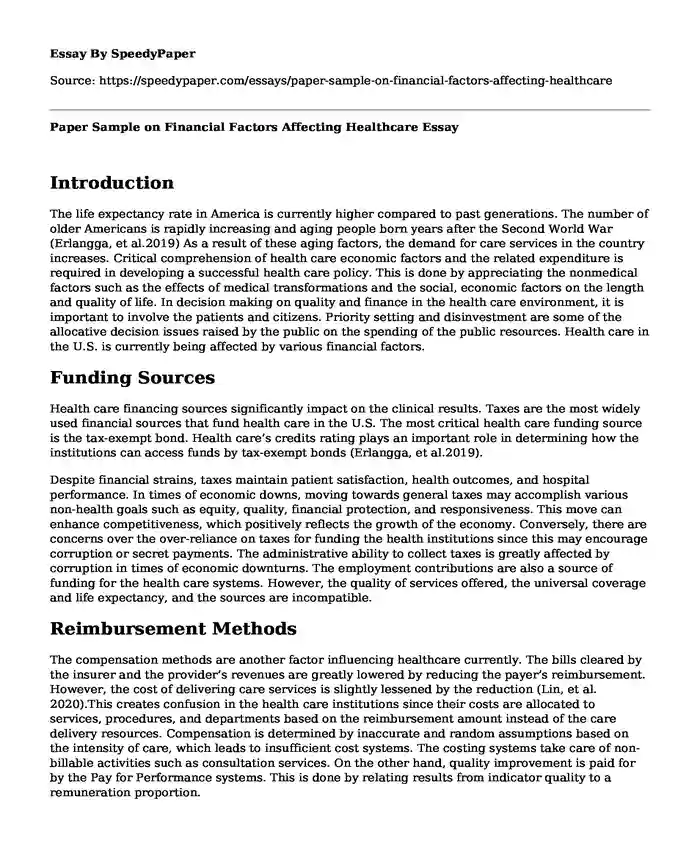
| Type of paper: | Essay |
| Categories: | United States Finance Business Healthcare |
| Pages: | 3 |
| Wordcount: | 757 words |
Introduction
The life expectancy rate in America is currently higher compared to past generations. The number of older Americans is rapidly increasing and aging people born years after the Second World War (Erlangga, et al.2019) As a result of these aging factors, the demand for care services in the country increases. Critical comprehension of health care economic factors and the related expenditure is required in developing a successful health care policy. This is done by appreciating the nonmedical factors such as the effects of medical transformations and the social, economic factors on the length and quality of life. In decision making on quality and finance in the health care environment, it is important to involve the patients and citizens. Priority setting and disinvestment are some of the allocative decision issues raised by the public on the spending of the public resources. Health care in the U.S. is currently being affected by various financial factors.
Funding Sources
Health care financing sources significantly impact on the clinical results. Taxes are the most widely used financial sources that fund health care in the U.S. The most critical health care funding source is the tax-exempt bond. Health care’s credits rating plays an important role in determining how the institutions can access funds by tax-exempt bonds (Erlangga, et al.2019).
Despite financial strains, taxes maintain patient satisfaction, health outcomes, and hospital performance. In times of economic downs, moving towards general taxes may accomplish various non-health goals such as equity, quality, financial protection, and responsiveness. This move can enhance competitiveness, which positively reflects the growth of the economy. Conversely, there are concerns over the over-reliance on taxes for funding the health institutions since this may encourage corruption or secret payments. The administrative ability to collect taxes is greatly affected by corruption in times of economic downturns. The employment contributions are also a source of funding for the health care systems. However, the quality of services offered, the universal coverage and life expectancy, and the sources are incompatible.
Reimbursement Methods
The compensation methods are another factor influencing healthcare currently. The bills cleared by the insurer and the provider’s revenues are greatly lowered by reducing the payer’s reimbursement. However, the cost of delivering care services is slightly lessened by the reduction (Lin, et al. 2020).This creates confusion in the health care institutions since their costs are allocated to services, procedures, and departments based on the reimbursement amount instead of the care delivery resources. Compensation is determined by inaccurate and random assumptions based on the intensity of care, which leads to insufficient cost systems. The costing systems take care of non-billable activities such as consultation services. On the other hand, quality improvement is paid for by the Pay for Performance systems. This is done by relating results from indicator quality to a remuneration proportion.
Economic Factors
Economic factors greatly contribute to longevity and health; this has a strong influence on healthcare actions. U.S. healthcare expenditure, both in dollar terms and as a percentage, is the highest globally (Erlangga, et al., 2019). The relationship between socioeconomic factors and the health outcomes are determined by the economic factors.
Business Influences
Currently, businesses have great financial responsibilities in the healthcare industry. The increasing cost pressure in healthcare has led to various changes in reimbursement patterns. Technologies have also been developed to utilize the emerging health information from different sources. Aiming to reduce the country's increasing healthcare costs, numerous initiatives have been developed by some innovators. Models such as the risk-sharing model that absorbs business and encourages wisdom in utilizing resources and reducing spending have been developed to replace payment for service plan.
Conclusion
Conclusively, financial factors have an important role to play in the healthcare industry. Some of the main contributors to the forces are factors such as funding sources, reimbursement methods, economic factors, business influences, and cost containment contribute to these forces. The enacting of the Affordable Care Act is one of the major achievements since it reduces the healthcare costs for Americans.
References
Erlangga, D., Suhrcke, M., Ali, S., & Bloor, K. (2019). The impact of public health insurance on health care utilisation, financial protection and health status in low-and middle-income countries: A systematic review. PloS one, 14(8), e0219731.
Griffith, K., Evans, L., & Bor, J. (2017). The Affordable Care Act reduced socioeconomic disparities in health care access. Health Affairs, 36(8), 1503-1510.
Lin, J. C., Kavousi, Y., Sullivan, B., & Stevens, C. (2020). Analysis of outpatient telemedicine reimbursement in an integrated healthcare system. Annals of vascular surgery, 65, 100-106.
Cite this page
Paper Sample on Financial Factors Affecting Healthcare. (2023, Dec 12). Retrieved from https://speedypaper.net/essays/paper-sample-on-financial-factors-affecting-healthcare
Request Removal
If you are the original author of this essay and no longer wish to have it published on the SpeedyPaper website, please click below to request its removal:
- Free Essay: Political, Cultural and Religious Sociological Aspects of Missionaries
- Investment Essay Sample: Risk and Returns Analysis
- Paper Example Business Operation and System of OfO
- Paper Example on Case Management and Health Care Reform
- Essay Sample on Ethical Issues in Advertising
- Free Essay Example. Spiritual Gifts at the Workplace
- Free Paper Sample: Impacts of Corona Virus Outbreak on America's Universities
Popular categories




